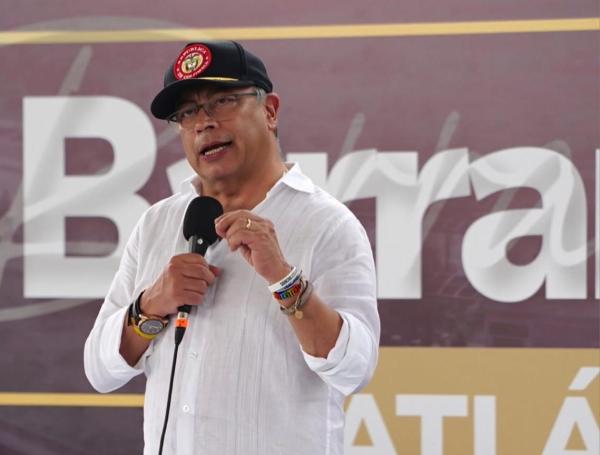'Colombia got off easy' with the United States' decision to decertify it in its fight against drug trafficking due to the country's weak results in that area. Although the decision was negative, it was not accompanied by economic measures that could further aggravate the current situation the nation is going through due to its fiscal crisis, according to some analysts consulted, who agree, however, that the measure is a strong warning to the Government to redirect its policy to combat narcoterrorism within the next year in search of greater and better results.
Unlike what the country's business leaders see, who believe that such decertification could generate a loss of investor confidence, consequences for bilateral trade, greater macroeconomic instability, a halt in the arrival of tourists, less possibilities for US companies to have operations in Colombia and an impact on the price of the dollar, among others, some analysts believe that this will not happen, at least in the short term, unless the national government adopts a defiant position in response to the measure, effective results are not achieved in the fight against drug trafficking in the next year and the United States maintains this measure or applies sanctions accordingly in 2026.
The most immediate impact of the measure could have been on the foreign exchange market, which has been declining in recent weeks, but this was not the case. The US currency remained below 3,900 pesos for most of the day and, on average, registered an additional drop of more than 15 pesos, reaching over 3,882 pesos on Tuesday, with which it has accumulated a loss of more than 526 pesos so far this year.
Regarding country risk, international markets and investors have been discounting the current adverse scenario for Colombia due to its fiscal crisis for some time. Therefore, the issue of decertification had already been mentioned and will not worsen those conditions given the way in which it was determined, that is, without any type of sanction or suspension of cooperation by the United States in the fight against drug trafficking.
The Colombian EMBI (Emerging Markets Bond Index), an index created by the investment bank J.P. Morgan, hovers around 255 points, one of the lowest levels in the last four years. This has been punished by higher interest rates on Colombian debt from international investors, meaning that the country is now finding it harder to obtain resources in the external capital market.
That's why Daniel Velandia, Executive Director of Research and Chief Economist at Credicorp Capital, believes that, despite the negative consequences of Colombia's decertification, the lack of additional measures means the impact on the economy is minimal.
"Of all the possible scenarios, the one that occurred is the least adverse for the country. Even the United States Business Ambassador to Colombia (John McNamara) said that this doesn't change anything for Colombia; it's more of a warning. The fear was that economic, political, or financing measures would be taken. Ultimately, President (Donald) Trump is giving the country a vote of confidence that with a change of government next year, things will begin to take a different direction in terms of the fight against drugs," the analyst commented.

Minimal effect
Other economists consulted expressed similar opinions, not foreseeing an adverse market reaction. Felipe Campos, Director of Research and Strategy at Grupo Alianza, maintains that, in principle, there is a more political than economic impact given the decision that comes close to the presidential elections, especially when the decision is not accompanied by additional sanctions.
"I don't think the markets are going to pay much attention to this issue, but if we were to go to 2026 without this decertification being lifted or economic sanctions being imposed, it would be a different scenario," warns the expert, after pointing out that this type of event could become of interest to the markets in the face of an escalation by the Colombian government such as, for example, a strong response that materialized in response to the United States' decision, something that Andrés Langebaek, director of Economic Studies · Grupo Bolívar, also agrees with.

For his part, Camilo Pérez, director of Economic Research and Market Analysis at Banco de Bogotá, doesn't believe there will be any impact because"the message from the United States was very forceful in the sense that collaboration continues and holds the political leadership responsible for this situation, while giving support to what Colombian institutions and regional governments have been doing" in the fight against drug trafficking.
Turning point
But there are those who believe the issue may not go unnoticed by the country's overall economy, and the effects of decertification will begin to emerge sooner or later.
"The decertification marks a turning point in the relationship with the United States. Beyond the diplomatic blow, its consequences will be felt in the real economy and the Colombian financial system: from access to foreign currency and credit to the confidence of investors and consumers," comments Víctor Ramírez, partner in Audit and Assurance, leader of the BDO Financial industry in Colombia.
The expert argues, for example, that in terms of foreign trade, since the United States is Colombia's main trading partner, this decertification opens the door to tariff or regulatory restrictions that would affect sensitive sectors such as coffee, flowers, bananas, and clothing.
He also believes that, with more than 25 percent of direct investment coming to Colombia from that nation, this measure could cool the appetite for new capital and slow down projects in hydrocarbons, infrastructure and technology, while multilateral organizations such as the IMF, IDB and World Bank, where the influence of the United States is decisive, could tighten financing conditions.
"The current situation requires strengthening economic diplomacy, diversifying export markets, and protecting the financial sector against volatile scenarios. The country's resilience will depend on its ability to demonstrate results in the fight against drugs while maintaining macroeconomic stability," said Ramírez of BDO Colombia.

One of the economic sectors most fearing a negative impact from the measure adopted by the United States on Monday is tourism, given the negative impact it has on the country's image abroad, which could ultimately affect incoming tourism from abroad.
"Tourism depends on a destination's reputation for safety and stability, and this could lead to stricter travel warnings (travel warnings), which would directly impact the interest of international travelers to visit Colombia, especially in the US market, which is one of the main issuers to Colombia," warns the union spokesperson, who adds that, in addition,"it would impact negotiations related to the opening of airline operations, the improvement of the flow on air routes, l a investment in tourism infrastructure, international competitiveness, the entry of foreign currency and would give greater space to the positioning of other destinations in the region."

